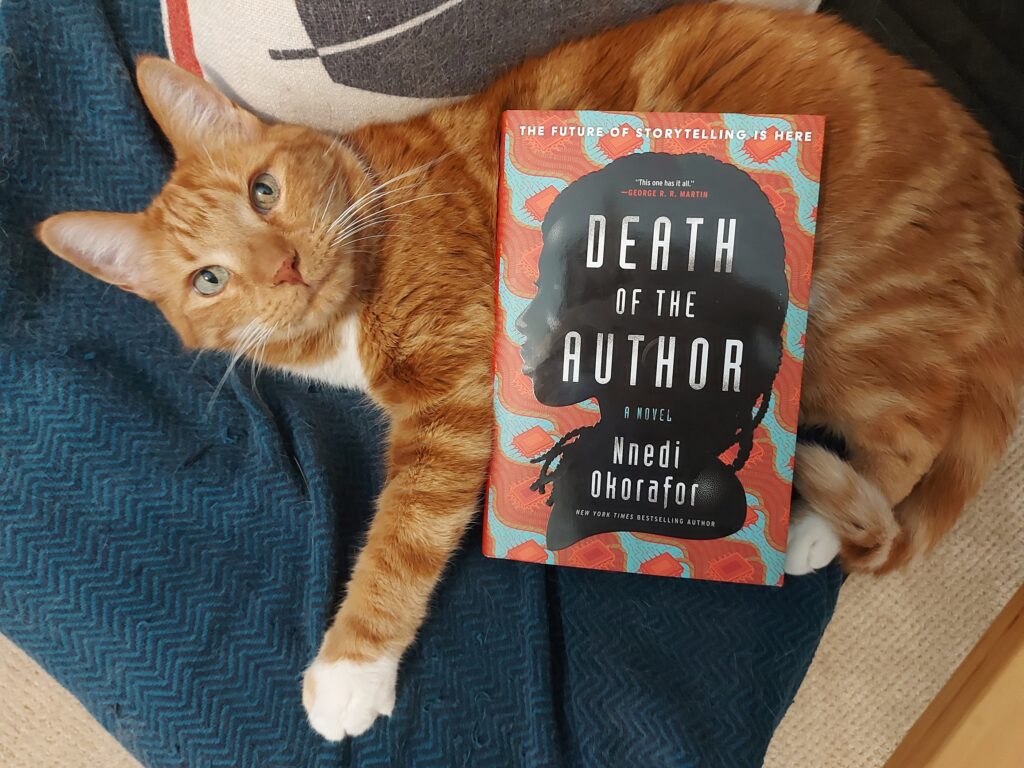Death of the Author by Nnedi Okorafor

Nnedi Okorafor is a writer of sci-fi and fantasy novels for both adults and children. Death of the Author is the first novel of hers that I have read, and I would say it is more literary fiction than sci-fi even though it has much to say about technology and Artificial Intelligence. I wasn’t sure I was going to like Death of the Author because of the sci-fi elements to the story (sci-fi isn’t really my jam), but I ended up really enjoying this novel.
Death of the Author is about a Nigerian American writer named Zelu, who is disabled after falling out of a tree as a child. I initially did not like Zelu as she is a peevish protagonist who is prone to making impulsive, and usually foolish, decisions, and so I thought I was in for a long read, but once I got to learn more about Zelu and her family, I could completely empathize with her character because her family is TERRIBLE. An imaginative and uninhibited woman with conservative parents and siblings, Zelu is constantly looked down upon because she isn’t an engineer/lawyer/physician like the rest of her family. Her family infantilizes her because of her disability and the PTSD that she still experiences from her fall from the tree, and they attempt to control every aspect of her life even though she is a grown-ass woman.
When Zelu is fired from her teaching job at a university after giving an entitled white male student an especially brutal critique of his work, and her literary novel is rejected by yet another publisher, Zelu, in a low moment, is inspired to write an Afrofuturistic sci-fi novel called Rusted Robots. Her novel is an immediate commercial and critical success, catapulting Zelu into fame and fortune, but her family can’t even pretend to be happy for her!
Zelu’s novel is a deeply personal homage to her Nigerian roots and her love of storytelling, but her intentions behind her novel become lost as it is adapted into a white-washed Hollywood blockbuster and Zelu is cancelled after publicly admitting that she does not want to be an advocate for people with disabilities. Yes, Zelu can be a selfish person, but does she really owe anyone anything, including other disabled people? Before falling out of the tree, Zelu wanted to be an astronaut. Why should she have to accept a life in a wheelchair when advancements in technology give her the opportunity to not only get back on her two feet but to also go into space?
Death of the Author is a work of metafiction because it also tells the story of Rusted Robots, which is about a robot named Ankara who lives in a post-apocalyptic world where humanity has become extinct. Ankara is a Hume, which is a robot designed to look like humans, and a Scholar who travels around Nigeria collecting stories that were created by humans before the stories are wiped out by another type of AI called Ghosts. Ghosts do not have a physical form and travel around in the network. They hate humanity and they hate Humes. Ankara ends up befriending a Ghost named Ijele and teaches Ijele that Ghosts have just as much humanity in them as Humes. They work together to try to stop a nuclear disaster from happening that would destroy all AI left on earth.
Death of the Author posits that AI will learn from us, their authors, to become storytellers. People are already using AI to generate stories, but will AI become capable of creativity, empathy, feelings and nuance to write its own complex stories with multiple themes and multifaceted protagonists? And what happens to humanity when AI transcends what we teach it?
I enjoyed both Zelu and Ankara’s stories, and the ending of Death of the Author was a great surprise to me, but I feel like Okorafor is either more optimistic about the future of AI than I am, or maybe what she sees is with humanity’s declining literacy and declining interest in reading for pleasure, AI will be what keeps storytelling alive in the future.